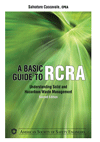 The U.S. Department of Labor’s Mine Safety and Health Administration (MSHA) has put three mining operations on notice of a pattern of violations of mandatory health or safety standards under Section 104(e) of the Federal Mine Safety and Health Act of 1977. The POV screening is the first one conducted since MSHA’s revised Pattern of Violations rule went into effect on March 25, 2013. These revisions improve MSHA’s ability to act when it finds a pattern of violations.
The U.S. Department of Labor’s Mine Safety and Health Administration (MSHA) has put three mining operations on notice of a pattern of violations of mandatory health or safety standards under Section 104(e) of the Federal Mine Safety and Health Act of 1977. The POV screening is the first one conducted since MSHA’s revised Pattern of Violations rule went into effect on March 25, 2013. These revisions improve MSHA’s ability to act when it finds a pattern of violations.
The three mines that received POV notices are: Tram Energy LLC’s Mine No. 1 in Floyd County, Ky.; Brody Mining LLC’s Brody Mine No. 1 in Boone County, W.Va.; and Pocahontas Coal Company LLC’s Affinity Mine in Raleigh County, W.Va. MSHA’s review for POV covered all 14,600 of the nation’s mines. The agency is still reviewing the injury records of several mines to determine if they should be considered for a POV notice based on this screening.
Greatest risk to miners
Under the Mine Act, MSHA is authorized to issue a POV notice to mine operators that demonstrate a disregard for the health and safety of miners through a pattern of significant and substantial violations. A POV notice, one of the agency’s toughest enforcement actions, is reserved for the mines that pose the greatest risk to the safety of miners. An S&S violation is one that is reasonably likely to result in a reasonably serious injury or illness. The Mine Act requires mines that receive POV notices to be issued withdrawal orders–effectively ceasing operations–for all S&S violations. After no mine was placed on POV for the first 33 years after the Mine Act went into effect, these POV notices mark the third year in a row that MSHA has used this critical tool to protect miners from serious hazards.
Operator negligence
Tram Energy’s Mine No. 1 received 120 S&S violations during the POV review period—more than half of those violations involved elevated levels of operator negligence. MSHA issued 40 closure orders at Tram Energy during the POV review period, the most of any mine in the country. The company has incurred approximately $170,000 in civil penalties since it began operating in 2012. All but $666 is unpaid and delinquent.
Brody Mining’s Brody Mine No. 1 received 253 S&S violations during the review period. An MSHA audit of Brody Mining’s records found that injuries of miners resulted in 1,757 lost work days at the mine, 367 of which were from eight lost-time injuries that Brody Mining failed to report to MSHA. The company was also audited during the 2012 POV screening process. In that audit, MSHA found 29 injuries Brody Mining failed to report and 724 unreported lost work days.
Two miner fatalities within two weeks
Pocahontas Coal Company’s Affinity Mine received 124 S&S violations during the review period, a quarter of which MSHA cited as involving high negligence or reckless disregard for the health and safety of miners. Two miners died in separate accidents during the review period; the fatalities occurred within two weeks of each other and both involved scoops. Affinity Mine received 35 closure orders during the review period, the third highest in the country.
The new rule eliminated the requirement that MSHA consider only fully adjudicated orders in its POV review, shifted responsibility for monitoring compliance to the mine operator and mandated that operators submit corrective action programs to proactively address issues that could lead to a POV.
Looking over their shoulders
In 2010, MSHA identified 53 mines for review, issuing 17 potential POV notices and two POV notices. The October 2011 screening resulted in the review of 39 mines and the issuance of eight potential POV notices. In 2012, MSHA identified 20 mines and issued four potential POV notices. This year, MSHA identified nine mines for additional review. The improvements made in 2010 to the screening criteria were designed to help MSHA better identify the mines that present the greatest risks to miners, and the criteria has remained largely unchanged since they were implemented.
“The decrease in the number of operators meeting the POV criteria shows that the POV process is working–many operators are cleaning up their acts, even when MSHA is not looking over their shoulders,” said Main.






